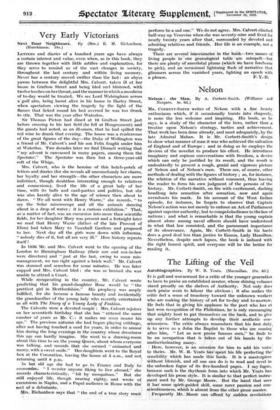Very Early Victorian „ s
Next Door Neighbours. By (Mrs.) E. Richardson.
(Hutchinson. 18s.) - -
ItcrrEns and diaries of a hundred years ago have always a -certain interest and value, even when, as in this book, they are thrown together with little artifice and explanation, for they serve to remind us of the vast changes in society, throughout the last century and within living memory. Never has a century moved swifter than the last : an abyss yawns between the delightful Mrs. Calvert, taken ill at her hOuse in Grafton Street and being bled and blistered, with twelve leeches on her throat, and the manner in which a mondaine of to-day would be treated. We see Lord Walsingham across a' gulf also, being burnt alive in his house in Harley Street, when spectators viewing the tragedy by the light of the flames that licked round his bed averred he was too drunk to stir. That was the year after Waterloo.
' Sir Thomas Picton had dined at 10 Grafton Street just before crossing to his last field (he fell at Hougoumont) and the guests had noted, as an ill-omen, that he had spilled the red wine he drank that evening. The house was a rendezvous of the great figures of the day—the Duke of Wellington was a friend of Mr. Calvert's and his son Felix fought under him at Waterloo. Two decades later we find Disraeli writing that "-my advent is canvassed in many papers, among them the Spectator." The Spectator was then but a three-year-old colt of the Whigs.
Mrs. Calvert, who is the heroine of this hotch-pooch of letters and diaries (for she reveals all unconsciously her charm, her loyalty and her strength—the other characters are more indistinct, though doubtless interesting enough to relatives and connexions), lived the life of a great lady of her time, with its balls and card-parties and politics, but she was also keenly alive to the age of science then about to dawn. " We all went with Henry Warre," she records, " to see the Solar miscroscope and all the animals dancing about in a drop of water ; it is a curious exhibition." That, as a matter of fact, was an excursion into more than scientific fields, for her daughter Mary was present and a fortnight later we read that Henry Warre (father of the late Provost of Eton) had taken Mary to Vauxhall Gardens and proposed to her. Next day all the girls were down with influenza, " nobody dies of it, but all are very ill." How history repeats itself !
In 1836 Mr. and Mrs. Calvert went to the opening of the London to Birmingham Railway (their son and son-in-law were directors) and " just at the last, owing to some mis- management, we ran right against a brick wall." Mr. Calvert was stunned and senseless for some minutes. He was later cupped and Mrs. Calvert bled : she was so bruised she was unable to attend a Court.
While. recuperating in the country, Mr. Calvert wrote predicting tliat his grand-daughter Rose would be " the prettiest girl in Hertfordshire." His prophecy was amply fulfilled, for she became a famous beauty and incidentally the grandmother of the young lady who recently entertained us all with The Diary of a Young Lady of Fashion.
The Calverts were a devoted couple : Mrs. Calvert rejoices on her seventieth birthday that 'she has- " entered the same number of years as Mr. C. : it makes me seem nearer hiss age." The previous autumn she had begun playing cribbage; after not having touched a- card for years, in order to amuse him during the long evenings in the'country whose dreariness this age can hardly imagine. She went 'to a drawing-room about this time to see the young Queen, about whom everyone was talking, and -records that she seemed "animated and merry, with a sweet smile." Her daughters went to the Royal box at the Coronation, leaving the house at 5 a.m., and not returning until 8 p.m.
In her old age she had to go . to France and Italy to economize. " I wonder anyone liking to live abroad," she records characteristically, " bit by mosquitoes." But she still enjoyed life, though nearing eighty,- and wrote of excursions in Naples, and a Papal audience in Rome with th zest of a debutante. •
Mrs. Richardson says that " the end of a true story must perforce be a sad one." We do not agree.. Mrs. Calvert climbed half-way up Vesuvius when she was seventy-nine and lived for nearly twenty years after that, surrounded by devoted and admiring relatives and friends. Her life is an example, not a tragedy.
There are several inaccuracies in the book—two names of living people in'-one genealogical table are misspelt—but there are plenty of anecdotal plums (which We have foreborne to pick), and an -Occasional lightning flash of narrative that gliminers across the vanished years, lighting an epoch with






























































 Previous page
Previous page